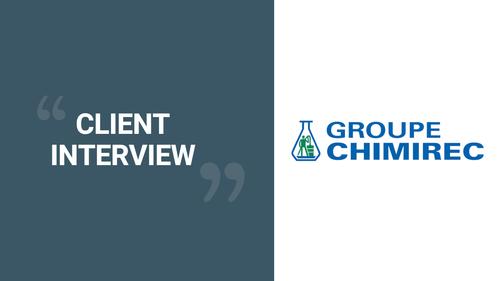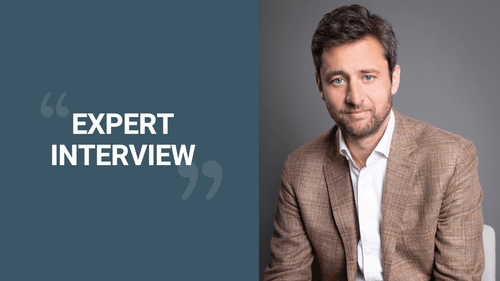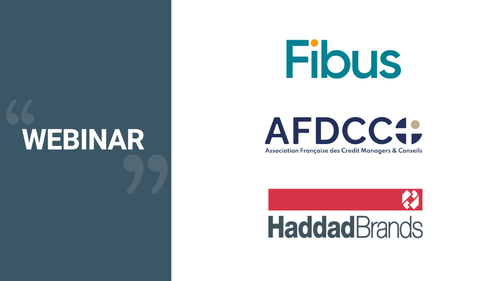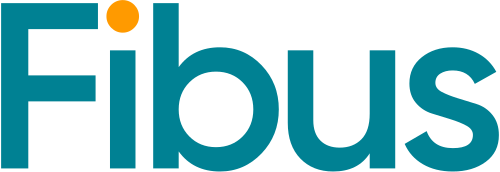How does factoring support the growth of international SMEs?
Discover the interview of Thibaut Robet in the programme LE GRAND ENTRETIEN with Thomas Hugues produced by Le Point and B SMART!
The Managing Director of Fibus answers the following questions:
▪ How does factoring serve the growth of international mid-sized companies?
▪ Why is it the tool to secure their activities amidst an economic downturn ?
▪ How does ARI Trade, Fibus' digital solution, optimise factoring and credit insurance programmes?
The Managing Director of Fibus answers the following questions:
▪ How does factoring serve the growth of international mid-sized companies?
▪ Why is it the tool to secure their activities amidst an economic downturn ?
▪ How does ARI Trade, Fibus' digital solution, optimise factoring and credit insurance programmes?


LE GRAND ENTRETIEN Fibus: five questions for Thibaut Robet
Transcription of the interview:
Thomas Hugues: Welcome FIBUS and its managing director, Thibaut Robet at Le Grand Entretien. Hello!
Thibaut Robet: Hello, Thomas!
T.H. Welcome! It is a pleasure to have you here. Explain to us what FIBUS is. How long has it been around, and what exactly is FIBUS?
T.R. FIBUS is a factoring brokerage firm. Our job is to assist companies and international mid-sized companies in structuring and utilising factoring effectively. It was established in 2006.
T.H. Under a different name, right?
T.R. Correct. The name was "Chateaudun Crédit" at the time.
T.H. Yes, "Chateaudun Credit" does ring a bell. I recall!
T.R. That's it exactly, Chateaudun Crédit. We changed the name about six months ago after realising that we were doing half of our business internationally and that...
T.H. … that Chateaudun wasn't famous all over the world, was it?
T.R. That’s it.
T.H. And so the new name FIBUS was born. What exactly is factoring? I admit I have no idea what it is, and I'm sure many viewers don't either.
T.R. Factoring is a type of financing technique that allows businesses to compensate for the payment terms they provide to their customers. For example, let's assume that a company has an annual turnover of 100 million euros, and that it invoices its customers within 60 days. This means that it is still waiting for two months' cash from its customers, i.e. 16 million euros. Factoring allows these funds to be returned to the company and used to fund operations and growth.
T.H. Are there any other businesses or know-how available at FIBUS?
T.R. Yes, we are also working on credit insurance. This is yet another important aspect of inter-company credit that makes business transactions more secure. This means that if you invoice your customer 60 days after delivery and they are no longer able to pay you, you will be compensated by an insurance company. Factoring requires credit insurance to work properly.
T.H. Why did you start this business? What was your initial observation?
T.R. The initial observation is that financing is critical to a company's growth. One out of every two mid-sized BtoB companies uses factoring. In fact, all banks offer similar financing options. However, establishing this financing method is difficult. Our job is to make factoring implementation as simple as possible. This technique will help you if you have several subsidiaries and, a team to train, and you want to ensure that you truly repatriate the maximum amount of financing within the company.
T.H. How do you position yourself? How do you position yourself in this factoring consultancy market? How much do you weigh, so to speak?
T.R. We currently account for 10% of the French factoring market, which amounts to approximately 400 billion euros in transactions. We represent approximately 40 billion euros in our brokerage activities, as well as in our software publishing activities, for there is a third activity that we have yet to mention.
T.H. Oh yes, that's right!
T.R. Two and a half years ago, we bought a software publisher that specialised in factoring. We thought that...
T.H. Wasn't there a piece of the puzzle missing there as well?
T.R. Yes, precisely. It is now a growth axis for us. It is something the market requires. Today, a company must be able to quickly implement factoring.
T.H. We'll keep talking about FIBUS and learn more facts and figures from Virginie Masse. Let's get started!
V.M. Created in 2005 by two co-founders, one of whom is your guest Thomas, FIBUS is the leading European factoring broker. By the end of last year, its workforce had expanded from 42 to 50 employees. 48% of FIBUS's turnover is generated internationally and it is currently active in 32 countries. In 2022, the French factoring market was worth 416 billion euros, with FIBUS accounting for 10%, or approximately 41 billion euros, of it. Finally, in 2022, FIBUS grew by 34%. The company is expanding at twice the rate of the market, which increased by 17% in the same year.
T.H. So I'd like to learn more about your clients. What is the size and type of their companies? And how do you help them?
T.R. Our clients are primarily international mid-sized businesses, as well as some large international groups. One interesting fact is that the ability to quantify the benefits of factoring in terms of a company’s cash flow is the first requirement for financial management. We perform an initial audit before launching a project of this nature to ensure that its cash flow provisions can be relied on. We assist with all phases of the project, from negotiations to selecting the bank with which the company will work, to team training and the setup of IT tools, after we have quantified and framed it with the financial management. We also assist the company until it is self-sufficient in its interactions with the bank.
T.H. I'm guessing your main contacts and clients are CFOs.
T.R. That’s it.
T.H. Your role is to advise and support them?
T.R. Exactly.
T.H. And make their job easier? The key word here is simplification.
T.R. That's exactly what I mean. We must absolutely simplify their tasks. Make factoring as simple as possible.
T.H. But why do these businesses come to you, FIBUS, rather than their bank?
T.R. In fact, one cannot be completed without the other. Our intervention supplements that of the bank. So, while the bank provides the financing, we handle all of the work required to integrate the solution into the company.
T.H. So, how has the market changed over time? We've taken stock of your progress. First, there was Chateaudun Crédit, and then, in the last six months, Fibus, which has continued to grow internationally. We saw the numbers: international sales account for 48% of your total revenue. How has the factoring market changed since the company's inception?
T.R. In fact, factoring is now the primary source of financing for inter-company credit in the majority of European countries. As a result, it now outperforms other financing methods such as overdraft lines or any other type of credit likely to finance a company's operations. That is the first breakthrough.
T.H. Then there's the issue of digitisation. You were referring to the third piece of the puzzle. Isn't it true that digital solutions are also a market that is rapidly expanding?
T.R. Exactly. Indeed, automation and digitisation of exchanges between companies and factoring firms has finally allowed this activity to flourish.
T.H. And how do you go about doing so? For we are in the midst of a simplification and acceleration era. There's "simplification," "speed," and then there's the risk factor. That is, how can we go faster while still meeting risk management objectives?
T.R. That's exactly the point. We are about to enter a challenging period. Businesses must consider how to secure financing for their operations. There are two major concerns here. First, there is the uncertainty of whether their customers will be able to repay them, and then there is the question of whether their banks will financially support them. Setting up a factoring programme is the best way to have stable financing that will weather the crisis. It's a precautionary measure.
T.H. What are the prospects for FIBUS looking forward? I'm guessing you have a market perspective now?
T.R. We do. It is to keep our international expansion going.
T.H. How many countries are you currently in?
T.R. We are now present in France. We work from France, throughout Europe, and for some European clients' US subsidiaries. We have set up a UK subsidiary. The most important presences in Europe for us would be in the UK and Germany.
T.H. Are there any other launches coming up in the next few weeks or months?
T.R. There are. The "ARI Trade" was launched in early 2023, for example.
T.H. What is "ARI Trade"?
T.R. "ARI Trade" is a software solution that connects all of the company's subsidiaries not only with its factoring company or companies, but also with the credit insurer who will cover the customer risk.
T.H. Does the feeling of "polycrisis" or "multicrisis" make your job, the challenge, more important in today's complicated economic context? And we'll end on that note.
T.R. In a way, yes. Clearly, the finance department cannot afford to make a mistake when establishing a funding programme of this magnitude. You must be able to quantify the contribution that this represents in order to know the stable funding resource on which you can rely. And it is precisely this security that we wish to offer to our clients.
T.H. Thibaut ROBET, thank you for introducing us to FIBUS in this episode of Le Grand Entretien.
Thibaut Robet: Hello, Thomas!
T.H. Welcome! It is a pleasure to have you here. Explain to us what FIBUS is. How long has it been around, and what exactly is FIBUS?
T.R. FIBUS is a factoring brokerage firm. Our job is to assist companies and international mid-sized companies in structuring and utilising factoring effectively. It was established in 2006.
T.H. Under a different name, right?
T.R. Correct. The name was "Chateaudun Crédit" at the time.
T.H. Yes, "Chateaudun Credit" does ring a bell. I recall!
T.R. That's it exactly, Chateaudun Crédit. We changed the name about six months ago after realising that we were doing half of our business internationally and that...
T.H. … that Chateaudun wasn't famous all over the world, was it?
T.R. That’s it.
T.H. And so the new name FIBUS was born. What exactly is factoring? I admit I have no idea what it is, and I'm sure many viewers don't either.
T.R. Factoring is a type of financing technique that allows businesses to compensate for the payment terms they provide to their customers. For example, let's assume that a company has an annual turnover of 100 million euros, and that it invoices its customers within 60 days. This means that it is still waiting for two months' cash from its customers, i.e. 16 million euros. Factoring allows these funds to be returned to the company and used to fund operations and growth.
T.H. Are there any other businesses or know-how available at FIBUS?
T.R. Yes, we are also working on credit insurance. This is yet another important aspect of inter-company credit that makes business transactions more secure. This means that if you invoice your customer 60 days after delivery and they are no longer able to pay you, you will be compensated by an insurance company. Factoring requires credit insurance to work properly.
T.H. Why did you start this business? What was your initial observation?
T.R. The initial observation is that financing is critical to a company's growth. One out of every two mid-sized BtoB companies uses factoring. In fact, all banks offer similar financing options. However, establishing this financing method is difficult. Our job is to make factoring implementation as simple as possible. This technique will help you if you have several subsidiaries and, a team to train, and you want to ensure that you truly repatriate the maximum amount of financing within the company.
T.H. How do you position yourself? How do you position yourself in this factoring consultancy market? How much do you weigh, so to speak?
T.R. We currently account for 10% of the French factoring market, which amounts to approximately 400 billion euros in transactions. We represent approximately 40 billion euros in our brokerage activities, as well as in our software publishing activities, for there is a third activity that we have yet to mention.
T.H. Oh yes, that's right!
T.R. Two and a half years ago, we bought a software publisher that specialised in factoring. We thought that...
T.H. Wasn't there a piece of the puzzle missing there as well?
T.R. Yes, precisely. It is now a growth axis for us. It is something the market requires. Today, a company must be able to quickly implement factoring.
T.H. We'll keep talking about FIBUS and learn more facts and figures from Virginie Masse. Let's get started!
V.M. Created in 2005 by two co-founders, one of whom is your guest Thomas, FIBUS is the leading European factoring broker. By the end of last year, its workforce had expanded from 42 to 50 employees. 48% of FIBUS's turnover is generated internationally and it is currently active in 32 countries. In 2022, the French factoring market was worth 416 billion euros, with FIBUS accounting for 10%, or approximately 41 billion euros, of it. Finally, in 2022, FIBUS grew by 34%. The company is expanding at twice the rate of the market, which increased by 17% in the same year.
T.H. So I'd like to learn more about your clients. What is the size and type of their companies? And how do you help them?
T.R. Our clients are primarily international mid-sized businesses, as well as some large international groups. One interesting fact is that the ability to quantify the benefits of factoring in terms of a company’s cash flow is the first requirement for financial management. We perform an initial audit before launching a project of this nature to ensure that its cash flow provisions can be relied on. We assist with all phases of the project, from negotiations to selecting the bank with which the company will work, to team training and the setup of IT tools, after we have quantified and framed it with the financial management. We also assist the company until it is self-sufficient in its interactions with the bank.
T.H. I'm guessing your main contacts and clients are CFOs.
T.R. That’s it.
T.H. Your role is to advise and support them?
T.R. Exactly.
T.H. And make their job easier? The key word here is simplification.
T.R. That's exactly what I mean. We must absolutely simplify their tasks. Make factoring as simple as possible.
T.H. But why do these businesses come to you, FIBUS, rather than their bank?
T.R. In fact, one cannot be completed without the other. Our intervention supplements that of the bank. So, while the bank provides the financing, we handle all of the work required to integrate the solution into the company.
T.H. So, how has the market changed over time? We've taken stock of your progress. First, there was Chateaudun Crédit, and then, in the last six months, Fibus, which has continued to grow internationally. We saw the numbers: international sales account for 48% of your total revenue. How has the factoring market changed since the company's inception?
T.R. In fact, factoring is now the primary source of financing for inter-company credit in the majority of European countries. As a result, it now outperforms other financing methods such as overdraft lines or any other type of credit likely to finance a company's operations. That is the first breakthrough.
T.H. Then there's the issue of digitisation. You were referring to the third piece of the puzzle. Isn't it true that digital solutions are also a market that is rapidly expanding?
T.R. Exactly. Indeed, automation and digitisation of exchanges between companies and factoring firms has finally allowed this activity to flourish.
T.H. And how do you go about doing so? For we are in the midst of a simplification and acceleration era. There's "simplification," "speed," and then there's the risk factor. That is, how can we go faster while still meeting risk management objectives?
T.R. That's exactly the point. We are about to enter a challenging period. Businesses must consider how to secure financing for their operations. There are two major concerns here. First, there is the uncertainty of whether their customers will be able to repay them, and then there is the question of whether their banks will financially support them. Setting up a factoring programme is the best way to have stable financing that will weather the crisis. It's a precautionary measure.
T.H. What are the prospects for FIBUS looking forward? I'm guessing you have a market perspective now?
T.R. We do. It is to keep our international expansion going.
T.H. How many countries are you currently in?
T.R. We are now present in France. We work from France, throughout Europe, and for some European clients' US subsidiaries. We have set up a UK subsidiary. The most important presences in Europe for us would be in the UK and Germany.
T.H. Are there any other launches coming up in the next few weeks or months?
T.R. There are. The "ARI Trade" was launched in early 2023, for example.
T.H. What is "ARI Trade"?
T.R. "ARI Trade" is a software solution that connects all of the company's subsidiaries not only with its factoring company or companies, but also with the credit insurer who will cover the customer risk.
T.H. Does the feeling of "polycrisis" or "multicrisis" make your job, the challenge, more important in today's complicated economic context? And we'll end on that note.
T.R. In a way, yes. Clearly, the finance department cannot afford to make a mistake when establishing a funding programme of this magnitude. You must be able to quantify the contribution that this represents in order to know the stable funding resource on which you can rely. And it is precisely this security that we wish to offer to our clients.
T.H. Thibaut ROBET, thank you for introducing us to FIBUS in this episode of Le Grand Entretien.
These articles may interest you

How Chimirec unlocked the full potential of its factoring with ARI Trade, by Fibus Digital
With ARI Trade, the Chimirec Group has reduced the time spent managing its factoring operations from 4 days to 1.5 days per month — representing a total time saving of 30 days per year.
Additional benefits for Chimirec’s CFO include improved working capital, a consolidated view across 15 factoring contracts, and enhanced receivables traceability.
Additional benefits for Chimirec’s CFO include improved working capital, a consolidated view across 15 factoring contracts, and enhanced receivables traceability.

How the Credit Manager safeguards the company’s cash flow
A function at the heart of financial stability The Credit Manager’s role extends far beyond preventing bad debt: today, they act as the true conductor of the order-to-cash process, ensuring the company maintains healthy, predictable, and actively managed cash flow. We
spoke with Thibaut Robet, CEO of Fibus, a firm specialising in order-to-cash management.
spoke with Thibaut Robet, CEO of Fibus, a firm specialising in order-to-cash management.

How can credit insurance support growth in a sector under pressure?
Economic difficulties are mounting and weighing more heavily on certain sectors: how can you make the Credit Manager a business partner who supports the company's growth? Discover the testimony of HADDAD BRANDS EUROPE in the webinar hosted by Alexia Monteillet, Credit Risk Manager at HADDAD BRANDS EUROPE, and Marc Chaquès, Credit Insurance Director at Fibus, in partnership with the AFDCC.
Contact us, so that, together, we can find the best solution for financing your accounts receivable.
Write us
